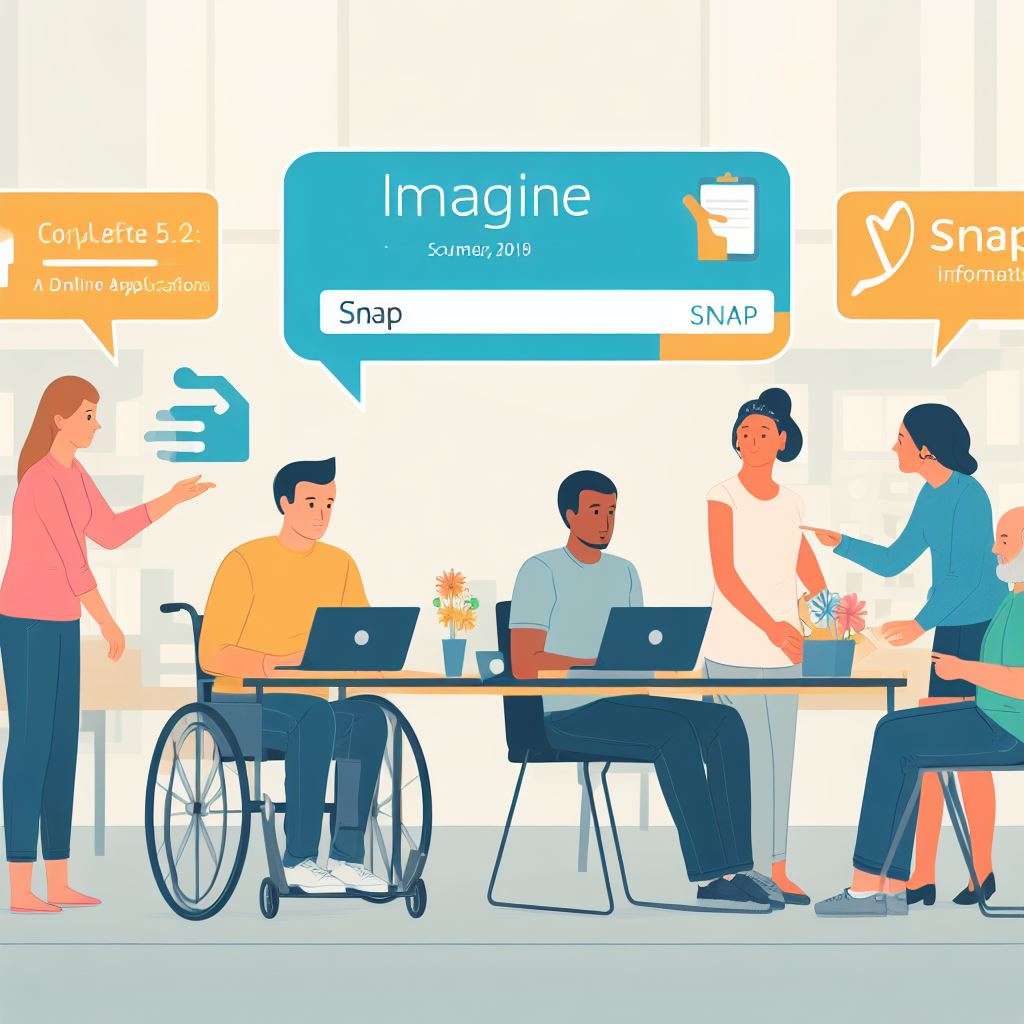3 Best Ways Disabled Individuals Can Get SNAP Benefits

Did you know that nearly one in five disabled individuals in the United States struggle with food insecurity?
If you or someone you know is facing this challenge, there are three best ways to access SNAP benefits and ensure you have enough to eat.
From understanding eligibility criteria to navigating the application process, this article will empower you with the knowledge and resources needed to access the support you deserve.
Key Takeaways
- Understanding the eligibility criteria empowers disabled individuals to determine their eligibility for SNAP benefits and take necessary steps to apply.
- Disabled individuals should gather necessary documents and complete the application form online or in person at the local SNAP office.
- It is important to provide accurate and complete information about household, income, expenses, and disability during the application process.
- Additional support services, such as employment and training programs, transportation assistance, Medicaid, and housing assistance, are available to disabled individuals based on their needs and circumstances.
Eligibility Criteria for SNAP Benefits
To determine if you’re eligible for SNAP benefits, you must meet certain criteria set by the government. These criteria are in place to ensure that those who are in need receive the assistance they require.
The first criterion is income eligibility. Your income must fall within the guidelines established by the government. This includes both earned and unearned income, such as wages, self-employment income, Social Security benefits, and unemployment compensation.
The second criterion is resource eligibility. Your assets, such as bank accounts, vehicles, and property, mustn’t exceed a certain limit. However, there are certain assets that are exempt, such as your primary residence and personal belongings.
The third criterion is citizenship and immigration status. You must be a U.S. citizen or a qualified non-citizen to be eligible for SNAP benefits.
Finally, the fourth criterion is work requirements. In general, able-bodied individuals between the ages of 18 and 49 without dependents must meet certain work requirements to maintain their SNAP eligibility.
Understanding these criteria will empower you to determine if you qualify for SNAP benefits and take the necessary steps to apply.
Application Process for Disabled Individuals
If you’re a disabled individual and meet the eligibility criteria discussed earlier, you can begin the application process for SNAP benefits. Applying for SNAP can seem overwhelming, but we’re here to guide you through the process step by step. Here’s what you need to do:
- Gather necessary documents:
- Social Security Number or proof of application
- Identification (Driver’s license, state ID, or passport)
- Proof of disability (such as a doctor’s statement or disability award letter)
- Proof of income (pay stubs, bank statements, or benefit award letters)
- Complete the application form:
- You can apply online through your state’s SNAP website or in person at your local SNAP office.
- Provide accurate and complete information about your household, income, expenses, and disability.
- If you need assistance with the application, reach out to your local SNAP office or a community organization that offers application assistance.
- Attend an interview:
- Once your application is submitted, you’ll be scheduled for an interview either in person or over the phone.
- Be prepared to discuss your disability and provide any additional information requested.
- Await a decision:
- After the interview, the SNAP office will review your application and make a decision within 30 days.
- If approved, you’ll receive an EBT card that can be used to purchase eligible food items.
Accessing Additional Support Services
Once you have been approved for SNAP benefits, you can access a range of additional support services to help meet your needs. These services are designed to provide you with the necessary resources and assistance to improve your overall well-being. One such service is the Employment and Training program, which can help you acquire the skills and knowledge needed to secure stable employment.
Through this program, you can receive job training, career counseling, and job placement services tailored to your abilities and interests. Additionally, you may be eligible for transportation assistance, which can help you get to and from work or job training programs.
In addition to employment support, you can also access healthcare services through Medicaid. Medicaid provides comprehensive medical coverage, including doctor visits, prescription medications, and hospital stays. This can be especially beneficial for individuals with disabilities, as it ensures access to vital healthcare services without the burden of high costs. Furthermore, you may be eligible for housing assistance, which can help you find affordable and accessible housing options that meet your specific needs.
Frequently Asked Questions
Are There Any Restrictions on the Types of Disabilities That Qualify an Individual for SNAP Benefits?
There are some restrictions on the types of disabilities that qualify for SNAP benefits. It’s important to understand the specific criteria set by the program. You can find more information and guidance from SNAP representatives.
Can Disabled Individuals Receive SNAP Benefits if They Are Already Receiving Benefits From Other Assistance Programs?
Of course! Disabled individuals can absolutely receive SNAP benefits, even if they are already receiving benefits from other assistance programs. It’s important to take advantage of all the help available to you.
Will Receiving SNAP Benefits Affect the Disability Benefits Received From Social Security?
Receiving SNAP benefits won’t affect your disability benefits from Social Security. Both programs have separate eligibility criteria. You can explore the best ways to get SNAP benefits as a disabled individual.
Is There a Limit to the Amount of Income or Assets a Disabled Individual Can Have in Order to Be Eligible for SNAP Benefits?
You don’t have to worry about income or assets limiting your eligibility for SNAP benefits. As a disabled individual, you can still receive the support you need to put food on the table.
Are There Any Specific Resources or Programs Available to Disabled Individuals to Help Them With the SNAP Application Process?
There are resources and programs available to help you with the SNAP application process. These can provide guidance and support, ensuring that you have the best chance of successfully accessing the benefits you need.



